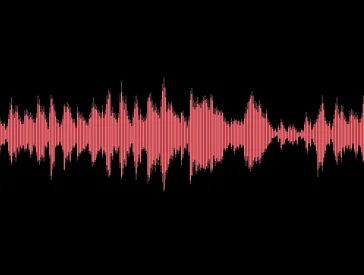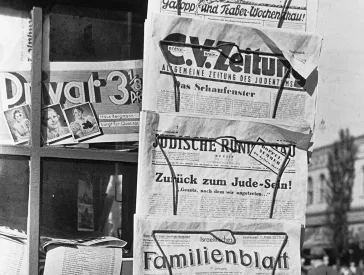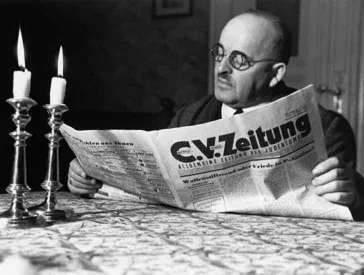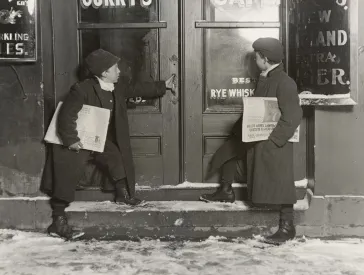The Exhibition and Event Preview for January to March 2013
Press Information
Press Release, Thu 13 Dec 2012
The Jewish Museum Berlin launches into 2013 with new exhibitions and a variety of film, music, art, and literary events. The exhibition "R.B. Kitaj (1932-2007) Obsessions," the first retrospective show after the artist’s death, can be viewed until 27 January. From 31 January, the Jewish Museum Berlin will present an online project entitled "1933. The Beginning of the End of German Jewry" on a special website. As part of the theme year "Destroyed Diversity" that remembers the Nazi’s rise to power 80 years ago, the archive will show historical records – each one relating to one day of 1933 – every week until the end of 2013. March sees the opening of two new exhibitions: The film installation "Roundhouse Reverb" from 15 March to 26 April transports its audience with the sounds of György Kurtág’s cycle "Kafka Fragments" on an imaginary journey to Eastern Europe. The first major exhibition of the year entitled "The Whole Truth ... Everything you always wanted to know about Jews" opens on 22 March. Exhibits from religious life, everyday life, and contemporary art pick up on funny, wise, polemical, and rhetorical questions about Judaism and raise sensitivity to stereotypical images and thought patterns.
The spring’s musical highlight is the chamber music festival "intonations. The Jerusalem International Chamber Music Festival at the Jewish Museum Berlin," held for the second time. Directed by Elena Bashkirova, the Glass Courtyard at the Jewish Museum Berlin will be filled with the sounds of young talents playing with internationally renowned soloists and musicians from orchestras such as the Berlin and Vienna Philharmonic.
- Contact
-
Press office
T +49 (0)30 259 93 419
presse@jmberlin.de
- Address
Jewish Museum Berlin Foundation
Lindenstraße 9–14
10969 Berlin
Special Exhibition with Accompanying Program in January
21 September 2012 to 27 January 2013
"R.B. Kitaj (1932-2007) Obsessions"
The first major retrospective show of the painter R.B. Kitaj since his death can be viewed until 27 January.
He was one of the pioneers of a new figurative style of painting in the 1960s. Together with his artist friends David Hockney, Lucian Freud and others he initiated the escape of art from abstraction. Kitaj’s works are seen as enigmatic, multi-layered, and provocative. The Jewish Museum Berlin is showing around 130 of Kitaj’s works from all periods of his oeuvre in 13 chapters, bringing together loans of leading museums and private collections from around the world. This is the first exhibition that provides insights into Kitaj’s private archive of texts and pictures which served as an inspiration for his works.
An exhibition organized by the Jewish Museum Berlin Foundation in cooperation with "Kulturprojekte Berlin GmbH."
Where: Old Building, first level
Admission: 4 €, reduced rate 2 euros
21 January
Themed Tour
Project head, Margret Kampmeyer: Human Pictures
n the 70s and 80s, Kitaj painted a series of figure paintings which differed from the complex themes of his earlier work. These images ushered in a new phase of his career in which Kitaj worked intensively with the human form, experimented with new materials such as pastels, and modified his technique. In this time, Kitaj directly confronted his own Jewishness and began to formulate his initial thoughts on his concept of a Diasporic art. The tour examines the extent to which the notion of a Diasporic identity is present in Kitaj’s human pictures.
Where: Old Building, first level at 7:30 pm
Duration: 1 hour
Admission: 7 €, reduced rate 5 euros
Bookings: tel. +49 (0)30 259 93 488 or reservierung@jmberlin.de
26 January
Literaray Salon
A Jew in Love. Philip Roth and R.B. Kitaj
The figure of wanton puppeteer Mickey Sabbath in the novel "Sabbath’s Theater" by Philip Roth was modeled on his longtime friend and neighbor, but other characters in the author’s works also have elements of R.B. Kitaj. In some surprisingly delicate drawings, R.B. Kitaj in turn portrayed Philip Roth.
At the Literary Salon, the actor Hanns Zischler will read from "Sabbath’s Theater," "The Human Stain" and other novels by Roth. Volker Hage, literary director at "Spiegel" and further guests will discuss the special relationship between writer and artist, art and literature.
Where: Old Building, second level, Great Hall at 7.30 pm
Admission: 9 €, reduced rate 7 euros
Visitor bookings on tel. +49 25993 488 or reservierung@jmberlin.de
Monday Movies
7 January
Ride Lonesome. Feature film by Budd Boetticher
((USA 1959, 73 mins, English, original version)
Randolph Scott plays a bounty hunter who has the task of escorting a wanted man on his way to Santa Cruz. Stills from "Ride Lonesome" inspired Kitaj in his creation of "Western Bathers" (1994).
14 January
She Wore a Yellow Ribbon. Feature film by John Ford
(USA 1949, 103 mins, English, original version)
After the battle at Little Bighorn, a retired Captain (John Wayne) embarks on a mission to prevent a massive Indian attack. Kitaj captures a scene from this film in his painting "The Ohio Gang," in which a girl with a yellow ribbon is courted by two suitors.
The events in the "Monday Movies" series are held in the Auditorium on ground level of the Old Building at 7.30 pm.
Admission free with seat ticket only (available at the cash desk).
Ticket reservation (for non-journalists) on tel +49 (0)30 25993 488 or reservierung@jmberlin.de
Special Exhibitions in March
15 March to 26 April
"Roundhouse Reverb"
A Film Installation of Kafka Fragments by György Kurtág
Two women travel eastwards from Berlin, in their luggage a violin and the Kafka Fragments music by the Hungarian composer György Kurtág. In an abandoned roundhouse along the railway line, they discover a resonant cavity which becomes a turntable through time – for the East through which singer Caroline Melzer and violinist Nurit Stark travel dissolves away from specific places and drifts into the imaginary. The women become figures that at times seem to stem from real socialism, at others from the world of Franz Kafka. Kurtág’s cycle of 1987 is heard in a film installation that explores the absurd potential of Kafka’s text fragments with music clips. The installation’s spatial arrangement is based on a roundhouse, a circular, industrial building with a turntable at its center. "ROUNDHOUSE REVERB" invites visitors to move freely within a circle of projection surfaces and thereby to make their own journey through the Kafka Fragments.
Concept/Realization: Isabel Robson and Susanne Vincenz
A production by "Roundhouse Reverb GbR" in cooperation with the Jewish Museum Berlin, deSingel International Arts Campus Antwerp, and "Deutschlandradio Kultur." Funded by the "Hauptstadtkulturfonds."
Where: Eric F. Ross Gallery in the permanent exhibition
Admission with the permanent exhibition ticket
22 March to 1 September
"The Whole Truth ... Everything you always wanted to know about Jews"
When asked why Jews always respond to a question with a counterquestion, "Why not?" is one rabbi’s answer. In the exhibition "The Whole Truth," the Jewish Museum Berlin presents various questions on the theme of Judaism – the FAQs, the uncomfortable, the funny, the clever, and those questions that cannot really be answered. Some questions are uncomfortable for the questioner, others not politically correct, others still reveal something about the person who posed the question. How do you become a Jew? What am I if my mother is a Christian and my father a Jew? How do Jews feel about Jesus and Mohammed? Are Jews the chosen ones? Surprising exhibits from religious and everyday life and contemporary art translate questions in a witty and easygoing way. Literary voices speak of Jewish identity today, films and interviews answer questions about following religious laws in everyday life. "The Whole Truth" thereby picks up controversial social debates, poses counterquestions, and not least raises sensitivity to stereotypical images and thought patterns.
A cooperation with the Jewish Museum Hohenems
With the friendly support of the Stiftung Deutsche Klassenlotterie (German Lottery Foundation).
Where: Old Building, first level
Admission: 4 €, reduced rate 2 euros
Online Project with Accompanying Program in January
31 January to 31 December
"1933. The Beginning of the End of German Jewry"
As part of the theme year "Destroyed Diversity," marking the 80th anniversary of the Nazi’s rise to power, the Jewish Museum Berlin will show a selection of historical records from the year 1933 from 31 January on its website.
The focus is to show how discrimination and persecution policy impacted individuals and how they in turn responded. The online project follows a calendar structure – each week documents and photographs will be shown that relate to that day 80 years ago. Gradually, a picture emerges of the harassment, exclusion, and deprivation of rights that shaped the everyday lives of German Jews. At the same time, the diversity of Jewish life in Germany present before 1933 becomes clear. The original documents stem mainly from private donations and bequests kept by the museum archive. Transcriptions and multimedia features enable these to be accessed by individuals.
www.jmberlin.de/1933
5 February
The Beginning of the End
A Cabaret Evening on the Year 1933 with the New Budapest Orpheum Society
Inspired by the Budapest Orpheum Society in fin de siècle Vienna, the new Budapesters from Chicago celebrate the diversity of Jewish cabaret. The program selected by the Jewish Museum Berlin is a journey back in time to the German-Jewish history of the 1930s and the music that accompanied it – poignant, controversial, tragic. The cabaret evening reflects the fate of musicians and critics of the time and acts of destruction and survival. The show will be hosted primarily in German and most songs will be German, with some songs in Yiddish, Hebrew, and English.
The New Budapest Orpheum Society, an Ensemble-in-Residence of the University of Chicago/USA, in cooperation with the MusikSalon Berlin of the Ethnological Museum, National Museums in Berlin
Where: Old Building, second level, Great Hall at 7.30 pm
Admission: 9 €, reduced rate 7 euros
Bookings: tel. +49 (0)30 259 93 488 or reservierung@jmberlin.de
16 March
Long Night of Museums: Destroyed Diversity
A half-hour tour through the permanent exhibition entitled "Destroyed Diversity" shows how the self image of many Jews as German citizens of Jewish faith was suddenly destroyed in the year 1933. The tour concludes with the April Boycott of 1 April 1933. Following this, photographs and documents from the online exhibition "1933. The Beginning of the End of German Jewry" will be presented on a large screen. This enables the viewer to understand the story from the perspective of Jewish contemporaries of that time.
Where: Permanent exhibition, every half hour from 6 to 10 pm
Admission with the Long Night Ticket
Further Cultural Program
6 March
Jews, to the Sun, to Freedom!
A Musical Revue on the 150th Birthday of the SPD
Who were the great Jewish figures of social democracy, why were Jewish men and women committed to the political left, what could they achieve there and which course did their often very unusual lives take? The biographical journey through time is framed by songs of the European labor movement. We invite you to a colorful musical biographical revue with Sigmar Gabriel and singer Jasmin Tabatabai.
In cooperation with the SPD executive committee and the Center for Research on Antisemitism
Where: Old Building, second level, Great Hall at 7.30 pm
Admission free
Bookings on tel. +49 (0)30 259 93 488 or reservierung@jmberlin.de
13 March
Amos Oz: Between Friends
Book Presentation with the Author
In his new collection of short stories, Amos Oz builds on his great successes and returns to the time that inspired him the most – his kibbutz years. The eight stories are set in the fictional kibbutz Ikat and draw beautiful portraits of women and men who indulge in their own dreams and their own pain, always in the shadow of the great dream of the collective. Each story is a literary gem, all together they make the image of a great idea. "These stories ... tell of the elemental forces of human existence. Of loneliness. Of love. Of loss. Of death. Of longing. Of sacrifice and of desire. So of the basic things that affect everyone." (Amos Oz)
A cooperation with the Literaturhandlung.
Where: Old Building, second level, Great Hall at 7.30 pm
Admission: 10 €, reduced rate 8 euros
Bookings at the Literaturhandlung on tel. +49 (0)30 8824 250
Advance Announcement
20 to 25 April
The chamber music festival "intonations – The Jerusalem International Chamber Music Festival at the Jewish Museum Berlin" will be held for the second time
From 20 to 25 April, the "Jerusalem International Chamber Music Festival" will be our guest in the Glass Courtyard at the Jewish Museum Berlin for the second time. Founded in 1998 by Elena Bashkirova, the Chamber Music Festival is one of the most important cultural events on the Israeli music landscape. Every year, international soloists and top musicians from orchestras such as the Berlin and Vienna Philharmonics play together with young talents.
The Jerusalem Festival will take place in Berlin once more with six chamber concerts:
Alongside selected works by great masters such as Franz Schubert, Felix Mendelssohn, and Ludwig van Beethoven, the focus will be on wonderful composers whose works have been unjustly forgotten as a result of persecution, expulsion, and camp imprisonment. They include Gideon Klein, Pavel Haas, Hans Krása, Viktor Ullmann and Erwin Schulhoff, who were murdered by the Nazis. Also included are Mieczysław Weinberg, who was forced to flee first from the Nazis and then from Stalin’s henchmen, Alfred Schnittke, whose artistry could not develop freely in the Soviet Union even after Stalin’s death, and Olivier Messiaen, whose "Quartet for the End of Time" was performed for the first time in the Görlitz-Moys German prison camp.
Besides well-known names such as Daniel Barenboim and Dominique Horwitz as speaker, numerous artists such as Gidon Kremer, Isabelle van Keulen and members of the Berlin Philharmonic and other leading orchestras are represented at the concerts – so far only known by a small group of experts but who belong to the absolute world elite.
With the friendly support of Evonik Industries AG
Where: Glass Courtyard, ground level



